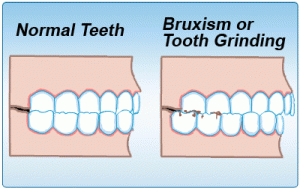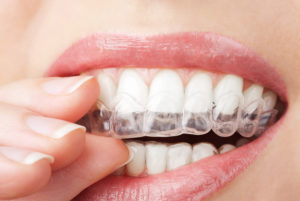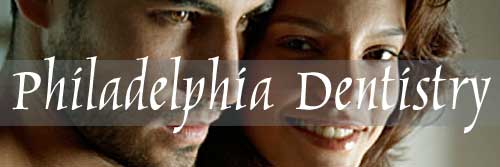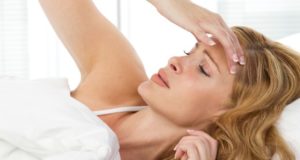Do you wake up with a headache? Do you ever experience soreness or tenderness in your jaw muscles? Does your jaw click when you eat? Do you ever have an earache? Neck pain? Ringing in your ears?
If you are answering yes to one or more of these issues, that could mean that you have Bruxism.
How do I know if what I’m experiencing is Bruxism?
The majority of patients have no idea that they are grinding and/or clenching in their sleep. It is difficult to know if you have Bruxism, especially because you don’t necessarily wake up while clenching/grinding. Below are some symptoms commonly associated with the condition:
- Sore and painful jaws and face muscles
- Frequent headaches that can extend down to the cervical spine and can be at the temple or the back of your head
- Tooth sensitivity
- Tightness in muscles in the jaw and in the neck
- Cracks in occlusal teeth surfaces
What is Bruxism?
 Bruxism is a common condition that means you are grinding or clenching your teeth. Now, this is not something that you may KNOW you are doing. It is something that is diagnosed by evaluating symptoms in conjunction with an examination from your dental team. Philadelphia dentists Dr. Cirka and Dr. Meier have been treating many patients over the years who likely have the same symptoms as you.
Bruxism is a common condition that means you are grinding or clenching your teeth. Now, this is not something that you may KNOW you are doing. It is something that is diagnosed by evaluating symptoms in conjunction with an examination from your dental team. Philadelphia dentists Dr. Cirka and Dr. Meier have been treating many patients over the years who likely have the same symptoms as you.
These sound like my symptoms, how can I be sure?
It’s best to see a dentist who can help you with the diagnosis and treatment. Your dentist can simply look at your teeth and know for certain if you have Bruxism. Much evidence will be on your teeth and gums that you may not be able to see in your mirror at home. Tiny cracks form on the top surface of the teeth or gums may be inflamed.
The dental team will use tools to show you the evidence and teach you what is happening with your teeth. The signs of Bruxism the dentists will be looking for include worn down enamel, chipping of the teeth, flattened teeth, and in some cases fractures and loose teeth.
Why Am I Grinding and Clenching My Teeth?
The cause of bruxism is not entirely known, however it is extremely common. One reason researchers have found, is a mis-alignment of the top and bottom teeth, however doctors often determine that the reasons are mainly psychological. Common thoughts about what triggers bruxism include but are not limited to stress, anxiety, frustration, and aggression.
If it is related to mis-alignment of the teeth, straightening of the teeth, such as using Invisalign may help.
What Can I Do?
 The most important thing to do after being diagnosed with bruxism is to make sure you protect your teeth and gums from further wear by using an appliance called an NTI device or a nightguard while you sleep. Make sure that you get a custom made appliance from a dental office because anything over-the-counter may make the issue worse. Nightguards are mainly for clenching. For patients who only clench and do not grind, often an NTI is prescribed.
The most important thing to do after being diagnosed with bruxism is to make sure you protect your teeth and gums from further wear by using an appliance called an NTI device or a nightguard while you sleep. Make sure that you get a custom made appliance from a dental office because anything over-the-counter may make the issue worse. Nightguards are mainly for clenching. For patients who only clench and do not grind, often an NTI is prescribed.
Tips Moving Forward:
Here are some more tips to help alleviate the symptoms:
– Avoid chewing gum and hard or chewy foods like bagels. This can increase jaw pain
– It is thought that alcohol use makes grinding worse. Limit use to help stop the urge to grind
– Stay away from drinks and food with caffeine as it is thought to increase grinding
-Alternating with ice and warm washcloths against your cheek can help the muscles relax
-Schedule an appointment with Dr. Ken Cirka or Dr. Jessica Meier as soon as possible so that they can help you. We offer a free initial consultation to determine what is actually needed.


